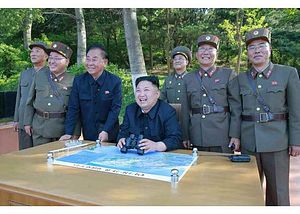With North Korea having seemingly succeeded in testing a hydrogen bomb at its sixth nuclear test, the world remains determined to find a final and effective solution to this problem. U.S. President Donald J. Trump called North Korea a great threat and other senior U.S. officials threatened to respond with military force. New sanctions will likely be passed at the United Nations to further weaken North Korea’s already weak economy, with the hope that the country’s path toward becoming a true nuclear power could at least be delayed, if not prevented.
None of this is new, of course. In an essay two years ago, I called for a coordinated approach to North Korea by the United States and China, with the U.S. providing more “carrots” to Pyongyang while China would provide more “sticks.” Obviously that approach has not been adopted and here we are, again, facing this dilemma. What can be done differently this time to finally solve the North Korea nuclear crisis — or is it too late to reach a solution given how far North Korea has succeeded?
Despite some pessimistic predictions regarding the state of the North Korea nuclear crisis, it is my belief that the major powers still have the time and resources to defuse the crisis as long as several preconditions are met.
The first precondition is that all major powers need to stop blaming each other for the current dilemma, regardless of the history of the problem. Indeed, it might be a huge debate when all sides try to figure out what went wrong at what stage in the past two decades since North Korea made up its mind to go nuclear.
We have seen most of these old debates, and frankly speaking, revisiting those debates is of no help to the current crisis. The most important thing is that all powers must agree that North Korea’s nuclear ambition is a threat, plain and simple, to all regional and global powers.
Without such a consensus, it is hardly possible to come up with a practical solution. The United States, particularly, needs to stop treating North Korea as China’s problem, wrongly and naively thinking that China holds the key to the solution. Similarly, the Trump administration should stop asking China to stop all trade with North Korea, for it is not only recklessly dangerous, but risks a humanitarian catastrophe. China, in the meantime, needs to stop treating North Korea as a buffer state against a U.S. threat and start treating North Korea as a normal state. As a matter of fact, North Korea’s nuclear weapons one day could hurt China the most—not South Korea, Japan, or the United States.
After such a consensus is reached, only then can major powers talk about practical strategies. We should also remember that North Korea is a rational state and its leadership under Kim Jong-un is also rational in pursuing this nuclear ambition.
First and foremost North Korea seeks survival in world politics like all other states do — and this point should be particularly emphasized to the U.S. side as many there seem to hold the mistaken view that North Korea and Kim Jong-un is simply crazy. A key component of the final solution, thus, would be to find an effective way to satisfy North Korea’s security concerns, which will not be easy, of course.
North Korea might not trust U.S. guarantees anyway, even if the United States is willing to offer one; and the U.S. might not be able to restrain itself when opportunity is available, as eminent political scientist James Fearon argued recently in a piece. Building trust is not an easy thing, but it has to start somewhere. Perhaps a collective security guarantee involving both U.S. and China would make more sense to Kim Jong-un or some other form of security by regional powers.
If such a collective strategy is feasible, then North Korea need to give up its nuclear programs in exchange of security, economic aid, and international recognition. Kim Jong-un might worry about his own dictatorship’s survival chances, but he also needs to develop North Korea to maintain legitimacy. A nuclear status might sound nice internationally, but it will not bring food and oil to ordinary North Koreans who hardly have anything to do nuclear weapons. Kim Jong-un might be persuaded that the long term future of North Korea relies on economic reforms and development, which, at this stage, is only hindered by his nuclear ambitions.
Great powers like the United States have great responsibilities when it comes to global affairs. The U.S. and China might make collective efforts to end the North Korea crisis before the worse can happen. The window of opportunity is small as there is only a two-year time period before North Korea finally goes nuclear, which would then require a much higher cost for all powers to handle it.

































